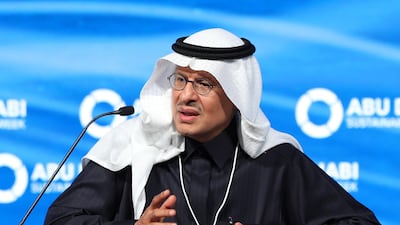Saudi Arabia is committed to reducing emissions and will increase the use of gas as fuel to generate power and add more renewables to its energy reserves in the coming years, the country’s energy minister said on Tuesday.
The world's largest oil exporter is looking to diversify its energy mix by adding cleaner sources of power as it looks to free up more oil for export.
The kingdom is pursuing an ambitious renewable power strategy and plans to add 60 gigawatts of clean energy capacity to the national grid by 2030. Of this, 40GW will come from solar photovoltaic plants, 16GW from wind turbines and 2.7GW from concentrated solar power, according to Saudi Arabia’s Ministry of Energy.
“The best power mix for Saudi Arabia is gas and renewables. By 2030, we will be developing our gas and we will be quite big in terms of our renewable use,” Prince Abdulaziz bin Salman told the World Future Energy Summit in Abu Dhabi on Tuesday.
“The more we use renewables and gas, the more we will be freeing [hydrocarbon] liquids which are exportable to the world oil markets.”
Saudi Arabia, the biggest Arab economy, currently produces 10 million barrels per day of crude and has around 260 billion barrels of proven oil reserves. It is also among the top 10 gas producers globally with over 900 billion cubic meters of proven gas reserves.
The country will focus on producing power through renewable sources, not only to meet domestic demand but also to export clean energy to other countries, Prince Abdulaziz said.
Last week, Saudi Arabia launched the third round of its renewable energy programme, which aims to add a total of 1.2 GW of solar photovoltaic power capacity to the grid.
Saudi Arabia is also encouraging the development of more clean energy companies in the kingdom to help it diversify its hydrocarbon-dependent economy. Currently, Saudi Arabia-based Acwa Power is leading the pack, developing projects at home and abroad, including a 240MW wind project in Azerbaijan.
“Developing our local companies and industries to make sure that they become as competitive as [the UAE's] Masdar, for example. We have Acwa Power and don’t be surprised if we have more than Acwa Power in this endeavour,” Prince Abdulaziz added.
Abu Dhabi-headquartered clean energy company, Masdar is currently developing renewable energy projects in several countries, including the 400 MW Dumat Al Jandal wind plant in Saudi Arabia.
The kingdom, the energy minister said, is undertaking a number of steps to reduce emissions including carbon capture sequestration, more efficient use of cars, changes to its building code and use of air-conditioning, among others.
“We have an effective efficiency programme because we believe in producing and using energy efficiently .... [in an] environmentally, safe and sound way.”
Saudi Arabia reduced its emissions by 2.8 per cent last year, ranking it fourth among G20 nations in terms of reduction in emissions.
“We have to also be [an] efficient consumer. It is extremely virtuous as a producing country that we present ourselves as an efficient user.”


